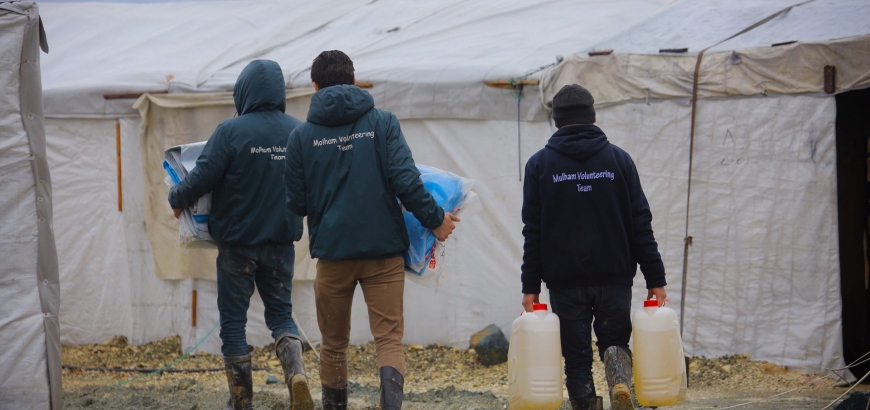As the ferocity of the regime and Russia’s attacks in the country’s northwest increases, displacing tens of thousands of families from their villages and towns, aid work in northern Syria is going through its most difficult time, with a clear decline in aid and major pressure on workers, as well as the withdrawal of UN and international agencies from carrying out their humanitarian duties.
Since last year, the UN offices concerned with providing humanitarian aid have complained of donor countries not fulfilling their obligations and the rates of allotted aid in Syria declining.
The responsibility for the terrible humanitarian situation for displaced people is not solely borne by international agencies and organizations alone, but was also observed in local associations and volunteer teams not offering aid at their usual pace.
The Molham Volunteering Team, which was formed by Syrian youths in 2012, has been able in recent weeks to offer major assistance to displaced people through donations from individuals concerned about the humanitarian situation, but today it suffers from a clear decline in the rate of donations in its campaigns.
The head of the team, Atef Nanoua, told Alsouria Net that the main reasons for the decline of volunteer work in northern Syria included the fact that, “the length of the tragedy had resulted in a decline of international sympathy and an increase in the needs of displaced people more than ever before. There has also been a decline in the material conditions of Syrians abroad, especially in Gulf states, as well as major security monitoring of their financial transfers.”
Nanoua said that, “the Assad regime has continued its massacres for years and this has not given these donors a chance to catch their breath. The response campaigns have come one after the other, which has sometimes decreased sympathy, especially among non-Syrian backers.”
Nanoua adds that there are other reasons for the weak donor response, related to, “the declining financial situation of a large number of Syrians in neighboring countries and in the Gulf, who had a major role in supporting their brothers and sisters, especially given that after Assad’s evictions from a large number of areas in Syria, they became responsible for sending financial support to their families in Idleb.”
Changing Interests and Fears
An aid official familiar with the course of events in Idleb and its environs said that the most important reasons for the decline of support included: “international organizations withdrawing due to the changing interests and priorities of backer countries such as the United States, which have stopped most of their programs in northern Syria and have directed efforts to areas controlled by the Syrian Democratic Forces. European countries’ participation has also been affected due to political sensitivities with Turkey, which have pushed them to close their offices and stop most of their programs.”
The official, who asked not to be named, added that other internal factors have created major obstructions in aid work, most prominently, “Hay’at Tahrir al-Sham taking control over Idleb, which was followed by donors placing conditions to prevent this aid reaching groups they consider to be terrorist.”
The official believes that aid work will not stop but that it will become more complicated and will need a long series of bureaucratic approvals and that this will lead to those in need feeling the backer states have failed them.
Impending Disaster
In this context, an administrative official from Syria Relief, an international organization that oversees a number of projects in northern Syria, said that, “support for most projects has stopped and the lack of new funding will lead to disastrous results in the coming months, especially in light of the continuing displacement, and the arrival of a large number of people to camps on the border with Turkey.”
The official, who asked not to be named, said that, “most international organizations currently in Turkey are moving to close because of their projects being stopped and not renewed.”
The official noted that the, “Turkish government’s conditions and its requirement that there be Turkish staff on the working teams, in addition to paying taxes, has also contributed to pushing these groups to other areas such as the Kurdistan region of Iraq and to Jordan.”
An administrator at Syria Relief said that political considerations could not be ignored when it comes to the international community giving up on Syrians, especially when we hear about decisions such as clearing camps in Turkey and countries not delivering the amounts they promised. All of it, according to him are, “messages which can be read as putting more pressure to accept a political solution which they want to see in Syria.”
This article was translated and edited by The Syrian Observer. Responsibility for the information and views set out in this article lies entirely with the author.


